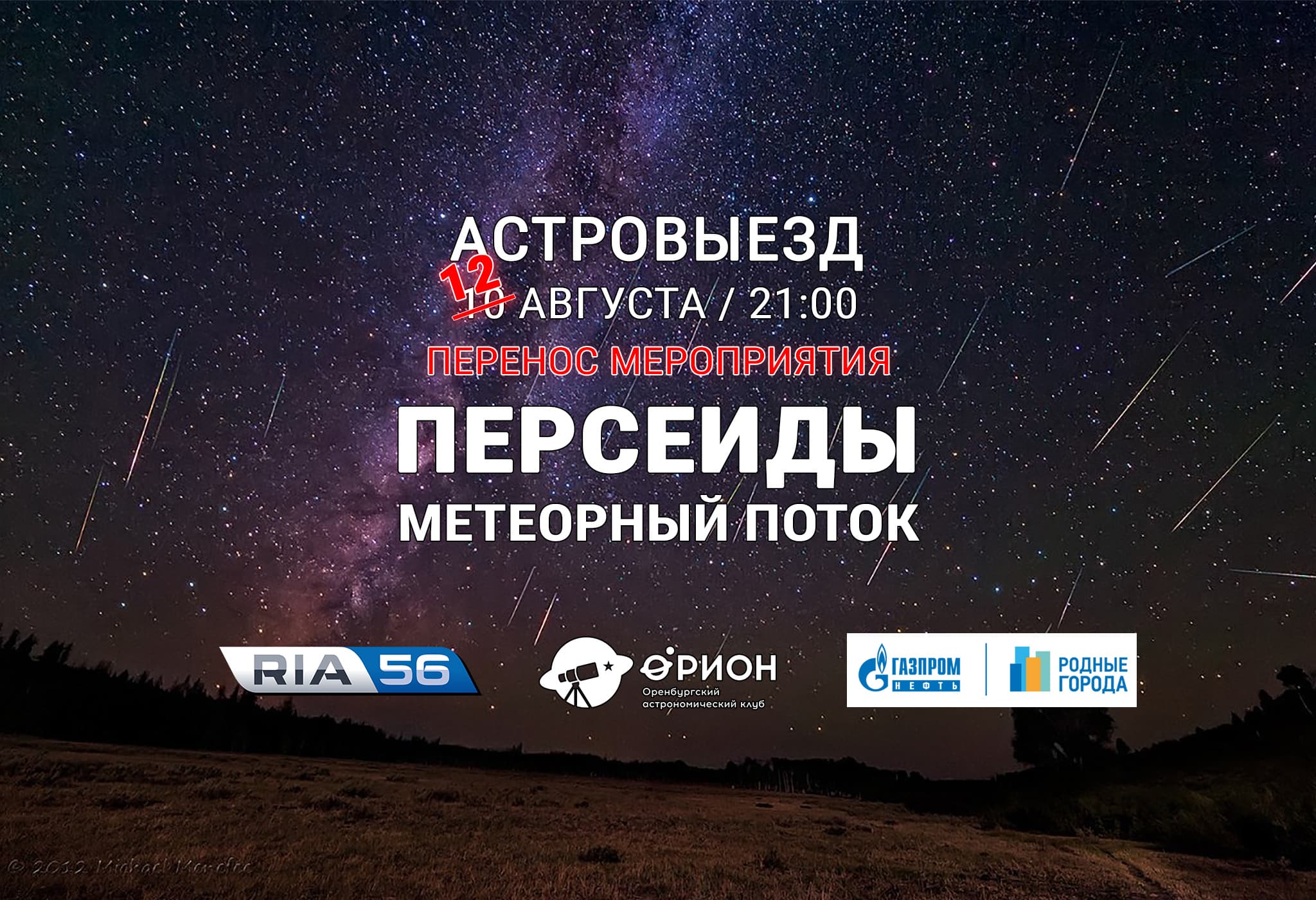
One of the most striking astronomical events of the summer!
The Perseid meteor shower, which occurs when the Earth passes through the trail of dust particles from Comet Swift-Tuttle, will reach its peak this weekend. Up to 80-120 meteors per hour are expected! Our astronomical community, as part of the RIA56 "Look at the Stars" project with the support of the "Native Cities" program (Gazpromneft-Orenburg), invites everyone to come out of town to our astronomical site to watch this amazing "starfall"!
Event details
Organizers and support
Organizers:
- Astronomical community "Orion"
- Regional information agency RIA56
Support:
- Social investment program "Hometowns" of the Gazprom Neft company
Event information
Date and time: 08/12/2018, starts at 22:20
Terms of participation:
-
Participation is paid: 200 rubles per person.
-
Children - free.
-
Recommended age: from 6 years.
Necessary things:
- Camping mat, foam, blanket or chair for comfortable placement.
- Tea, cookies, candy, sandwiches - appetite comes quickly in the fresh air.
- Warm clothes (it's cold at night).
- Good mood!
How the astrotour goes:
- The first part of the program is a lecture on astronomy, meteors, asteroids and comets.
- The second part is a tour of summer constellations, legends and orientation in the sky.
- The third part is observations through telescopes: planets of the solar system, double stars, star clusters, nebulae, the Andromeda galaxy, globular clusters.
Event program
- Lecture:
- What are meteors, asteroids and comets?
- Their role in space and potential threat to our planet.
- Overview of telescopes:
- The structure of telescopes, their differences, which telescope is better and what can be seen through them.
- School of astrophotography:
- How to take astrophotos and shoot night landscapes.
- Special trick: how to capture falling meteors (a DSLR camera with the ability to set the shutter speed up to 25 seconds and a tripod will come in handy).
- Astronomy quiz:
- Interesting questions about space. Prizes for the most erudite participants.
- Constellation tour:
- Summer constellations, their legends and ways to navigate in the sky.
- Observations:
- Perseid meteor shower: interesting facts about "falling stars".
- Observations with telescopes: Mars, Jupiter, Saturn, double stars, star clusters, nebulae, the Andromeda galaxy, globular clusters.
Prohibited actions
- Leaving litter.
- Smoking.
- Drinking alcoholic beverages. - Being drunk.
- Being disrespectful to other participants of the event.
Results of the astronomical event
Hooray, we did it — we watched the largest "starfall" of 2018!
More than 400 astronomy enthusiasts gathered on Mount Goryun on Sunday. It was the second major astronomical event of the outgoing summer. Favorable weather, a clear and warm night created ideal conditions for observing the night sky. The Perseid meteor shower pleased with its activity: about 80 meteors per hour — about every minute a "shooting star" flashed in the sky.
Lectures and stories:
- Sergey and Misha explained what meteor showers are, how meteors differ from meteoroids, how much meteorites cost and where they can be found.
- Lyudmila Dmitrievna, lecturer at the Orenburg Planetarium, spoke about visible summer constellations, bright stars and legends associated with them.
Observations:
- Vladimir Ivanovich conducted observations through telescopes, showing everyone who wanted to see Mars, Saturn (even Venus was visible at the beginning of the evening), double stars, globular and open star clusters.
Acknowledgments:
- Thanks to RIA56 and the Rodnye Gorody program (Gazpromneft-Orenburg) for the equipment that helped make the lectures more visual and interesting.
- Special thanks to all participants for their active participation and interest in science.
"We are very glad that you find time to come out of town and observe the starry sky. It is truly inspiring!"